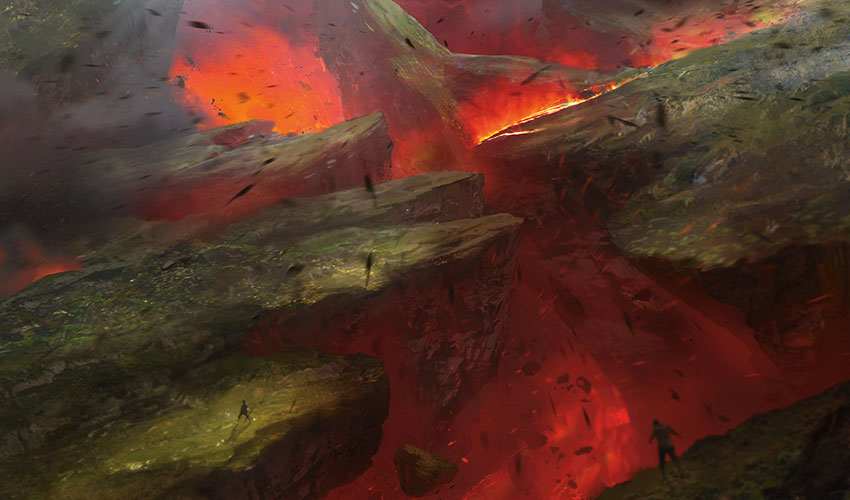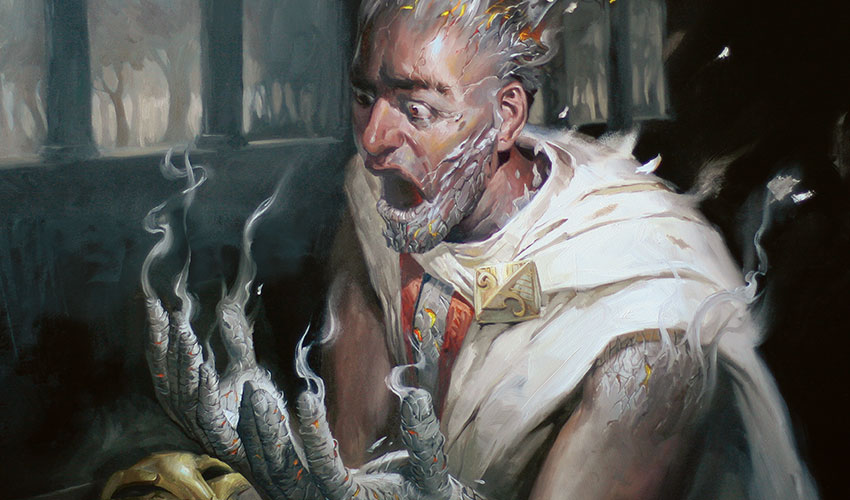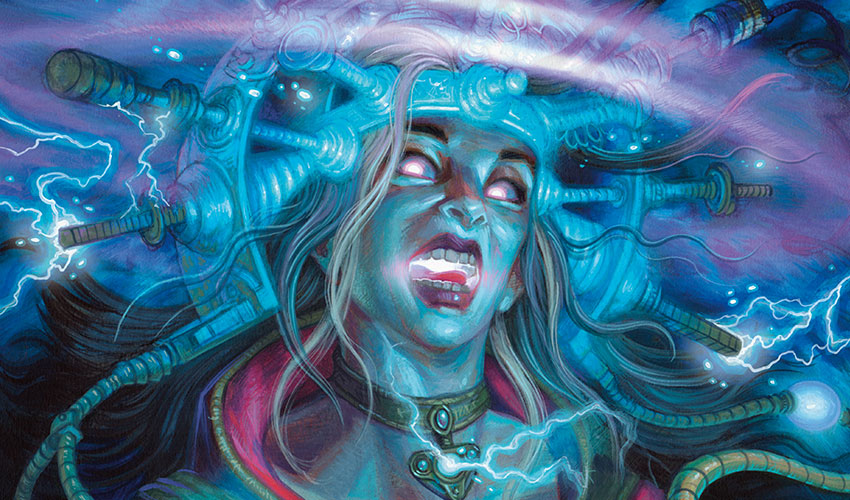Do(n't) Play Lands
One of the very first rules you learn when you start playing Magic is that you can play a land every turn. We learn right away the benefits of playing a land each turn as we move from casting Runeclaw Bears to Centaur Coursers to Baloth Gorgers: the benefits are evident right away.
How many lands have you played since that moment? Over and over again, we slam our lands down, building our resources higher and higher each game. There have been thousands upon thousands of words about how to play these resource-laden rectangles.
So today, we're going to do just the opposite. In this article, I'm going to be talking about when not to play your lands!

No, I'm not talking about playing a deck without lands in it, nor am I going to reveal why you shouldn't play a land on turn one. Rather, there are a lot of times where playing lands out of your hand isn't actually beneficial.
We've all been there before. You have five lands on the battlefield. Your hand is empty. You draw a card and
Sometimes yes. Sometimes no. Today, we're going to dig into why.
Let's get started!
The Knowledge War
There are two main categories of why you wouldn't want to play lands out of your hand. The first is less about using the lands for game function and more about using them as tools at your disposal to deprive your opponent of information.
Let's start with level 1, what we learned when we all started: play a land every turn of the game. This tells you that if you have a land in your hand and nothing else, you should play it. Simple enough.
What's potentially wrong with this approach? It tells your opponent you have no cards in your hand—and now they have all the information. They know just as much as you do about the board state, which means there are no combat tricks, burn spells, or countermagic to play around. They no longer have to factor in what you could have when making decisions.
So that's how we get to level 2: hold your last land in your hand if it's all you have. This is extraordinarily common and how a lot of people play Magic.
The rationale here is that by holding one land in your hand, you can always play it next turn if you draw a spell that needs it. It doesn't delay anything you're going to cast. And in the meantime, it means your opponent can't quite be sure you don't have anything tricky going on. That card in your hand could be anything! You've gained a lot of strategic ability for merely holding a land you could play next turn if you needed it anyway.
While I see that one a lot, what I see significantly less often is the natural extension of that and what I'll call level 3: holding multiple lands in your hand.

I'll never forget a Faeries mirror I was playing against Ari Lax. It was deep in the game. He had three cards in his hand, drawn over the past few turns. I cast a Thoughtseize to try and take out whatever he was holding, and saw
He had been drawing them and holding them intentionally, making me think he had a hand full of options when really it was all lands. That expanded my mind to a whole new range of play.
While you do start to lose a bit of flexibility by holding more lands, if you know your deck, it shouldn't be an issue. If your Draft deck has a curve that stops at five mana, you know that as long as you have access to five mana next turn, you're on the safe side. (Though some things like bounce spells can throw a wrench into the works.) In the meantime, you can force your opponent to play more conservatively—and at very, very little cost to you.
Another direction you can take is switching it up. This is level 4, the most extreme and kind of unconventional: back to playing the last land out of your hand.
Wait
The idea here is that an observant opponent will notice how you play and make mental notes on it during the game. If you have no cards in your hand, draw a card, and play the land out of your hand, I've mentally categorized you as someone who plays the last land out of their hand. So, if you do that once or twice, and then draw a card and hold it, I'm definitely going to assume it's a nonland
So, in a way, we've come full circle. Insert expanding-brain meme here.

Of those four levels, which one is the best to use?
Ultimately, it depends on your deck and the game. In general, you should default to at least level 2 and likely level 3. But your deck and the matchup can matter a lot.
How so? Well, that's how we get to the second category!
Matchup Decisions
The composition of the decks involved can dictate a lot about when you should or shouldn't play your lands. After all, while you are holding them to gain a bluffing advantage, that shouldn't outweigh things that provide a stronger gameplay advantage.
Let's start with looking at your deck.
A simple example is this card:
If you start holding multiple lands and then you draw a Blaze and need to cast it for a higher number, you're going to be pretty sad you didn't put out more lands. Knowing that this is a card in your deck will impact this decision. You're still okay to hold one land with a Blaze, but holding two could prevent you from getting maximum damage out of it.
There's also draw spells. This is a big one.
Let's say your deck contains something as simple as Divination.
You have seven lands. Nothing in your deck costs eight mana. You have been holding one land, and you draw Divination. You cast it and draw an Island and In Bolas's Clutches.
Whoops!
If you had played your land last turn, you'd be able to play the other land you drew and cast In Bolas's Clutches this turn. But because you decided to hold off and bluff with the land, you're now delayed a turn.
Those are a couple reasons to play your lands. But there are also reasons to hold them.
One you'll see all over the place in Guilds of Ravnica is jump-start!
In this Limited format, if you have jump-start cards in your deck, holding a land can be more important than ever. That land which would otherwise be useless on the battlefield can become 2 damage, two cards, or more! That's absolutely huge, and in this format, I've found myself holding lands more than any other in recent memory.
And the same is true of anything that lets you turn your lands into more action: Merfolk Looter–style cards, Seismic Assault, and so on.
There's also your opponent's deck to consider.
In addition to holding lands, denying the opponent information, it can also protect your other cards.
A common example of this is when you're playing against black. If I'm playing out my excess lands and holding, say, a Citywide Bust for later in the game, and my opponent casts a Burglar Rat or Disinformation Campaign and forces me to discard a Citywide Bust, that's huge!
Holding a land to protect your cards against discard like this—or playing them out if nothing else is in your hand—are absolutely things to keep in mind.
Spells that return permanents to your hand, "soft counterspells," like Mana Leak and land destruction, are just two other examples of the many, many kinds of cards that your opponents could use to punish you for playing or not playing lands. Ultimately, it really does depend on what colors they are playing and what you think they might have access to. This is a lot easier to figure out in a Constructed format than in a Limited one, but absolutely still worth thinking about. If your opponent has a Fall of the Thran, you definitely want to hold extra lands in your hand to rebuild with!
In Limited especially, keep in mind what your opponent has played in previous games and what's at common in the set; that can really help inform your decisions.
Land's Edge
There is no easy answer to whether you should play your late-game lands. But with the tools in this article, hopefully you feel better equipped to go out and make some decisions you might not have realized you had before.
If you weren't holding lands before, perhaps now you'll try—and if you always held lands before, maybe now you'll play them out more often. The right balance between strategy and bluffing is up to you. Know the decks and study your opponent's plays, and you can come out with the right decisions.
Have any thoughts on this article or anything else around Magic? I'm always happy to hear from you! You can always reach me by sending in a tweet, asking me a question on my Tumblr, or sending me an email at BeyondBasicsMagic@gmail.com. Let me know what you think!
Have fun with Guilds of Ravnica and Magic: The Gathering Arena, and I'll talk with you again soon!

